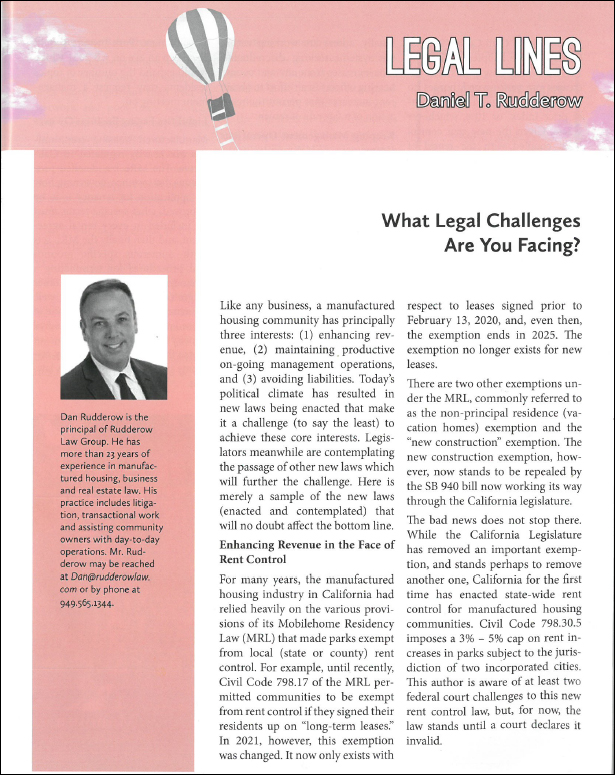
Rent Control Challenges for Manufactured Housing Parks – WMA Reporter Magazine May 2022
Like any business, a manufactured housing community has principally three interests (1) enhancing revenue, (2) maintaining productive on-going management operations, and (3) avoiding liabilities. Today’s political climate has resulted in new laws being enacted that make it challenging (to say the least) to achieve those core interests. Legislators meanwhile are contemplating the passage of other new laws which will further the challenge. Here is merely a sample of the new laws (enacted and contemplated) that will no doubt affect the bottom line.
Enhancing Revenue in the Face of Rent Control
For many years, manufactured housing industry in California had relied heavily on the various provisions of its Mobilehome Residency Law (MLF) that made parks exempt from local (state or county) rent control. For example, until recently, Civil Code 798.17 of the MRL permitted communities to be exempt from rent control if they signed their residents up on “long-term leases.” In 2021, however, this exemption was changed. It now only exists with respect to leases signed prior to February 13, 2020 and, even then, the exemption ends in 2025. The exemption no longer exists for new leases.
There are two other exemptions under the MRL, commonly referred to as the non-principal residence (vacation homes) exemptions and the “new construction” exemption. The new construction exemption, however, now stands to be repealed by the SB 940 bill now working its way through the California legislature.
The bad news does not stop there. While the California Legislature has removed an important exemption, and stand stands perhaps to remove another, California for the first time has enacted state-wide rent control for manufactured housing communities. Civil Code 798.30.5 imposes a 3% – 5% cap on rent increases in parks subject to the jurisdiction of two incorporated cities. This author is aware of at least two federal court challenges to this new rent control law, but , for now, the law stands until a court declares it invalid.
In addition to civil code 798.30.5, California also adopted civil code 1947.12 which now limits rent increases on park-owned homes to 5% plus the change in the consumer price index, or 10%, whichever is less. Given the new rent control laws, coupled wit the repeal of many exemptions, the manufactured housing community is in the search of new options, a new game-plan. Some have sought to achieve memorandums of understanding or other agreements between stakeholders as an alternative to rent control as we recently accomplished in Sunnyvale, California.
Finally, other are working within the system, seeking discretionary rent increases from city and county hearing offices in an effort to obtain rent increases that permit the realization of a fair rate of return.
Keeping Management Operations Going
There are numerous legal challenges to maintaining efficient day-to-day park operations. Too many to list here. But some of the most significant would include newly amended Civil Code 798.23 that prohibits park owners from renting park-owned homes if the park prohibits tenants from subleasing their homes. In addition, currently being considered by the California legislature is SB 869 that would require park managers to undergo 18 hours of training provided by the Department of Housing and Community Development. Park owners should also keep and eye on AB 2031 which would expand the number of topics residents may request a management meeting on.
Liabilities Facing Business Owners
Manufactured housing communities are heavily regulated in California. The MRL has detailed provisions, for instance, governing how and application for tenancy is to be approved, what specific terms must be included in every rental agreement, and then finally the MRL sets fourth numerous specific grounds and procedures for terminating a tenancy. There are numerous other topics covered by the MRL as well. A manager who violates any one of these laws may be subject to a civil penalty of $2,000 per violation, or worse, the park may be sued by residents in a failure-to-maintain lawsuit.
Pooling Your Resources to Succeed
Given the legal challenges that affect revenue, operations, and liabilities, it is more important than ever to network and pool one’s resources and talent. Attacking rent control, for instance, involves not only selecting zealous lawyers to advocate for an owner’s economic interest, but also selecting the right economic consultants and experts who can articulate clearly and persuasively what it will take to afford an owner a fair return.
Maintaining operational issues requires competent and skilled park managers, something not easy to achieve in this tight labor market. It is for this reason park communities are relying more than ever on expertise of professional management companies. This is the WMA Reporter’s membership issue. Whether you are already a member or contemplating becoming a member, it is important to remember that WMA’s value as a resource is the number of other resources and professionals that are part of its organization. WMA’s membership includes accountants, attorneys, appraisers, property managers, civil engineers, utility companies, real estate brokers, insurance brokers, solar energy providers, bankers, and retired governmental officials, just to name a few.
So, my takeaway message is this: There are numerous legal challenges facing our industry, but, community owners should know there are also numerous resources that are available so those challenges may be met. You are not alone in the battle.
CLICK BELOW TO VIEW ARTICLE
